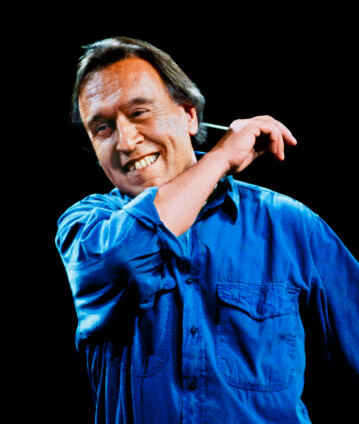Claudio Abbado
Chief conductor 1990–2002
Before being elected as chief conductor by the Berliner Philharmoniker in 1989, Claudio Abbado, born in 1933 to a family of musicians, had already held some of the most influential positions in classical music with leading posts at the Scala in his home town of Milan, the London Symphony Orchestra and Vienna.
Abbado’s era lasted until the year 2002. During this time, the orchestra was rejuvenated by new members and developed the art of listening to each other and playing together as if it was a chamber music ensemble: “Making music is like a conversation in which one not only listens attentively, but also addresses the other and tries to grasp the unspoken feelings and thoughts as well,” was Abbado’s credo. His repertoire ranged from Monteverdi to Luigi Nono and Wolfgang Rihm, with an emphasis on Classical-Romantic symphonic music, Russian and French music, the works of the Second Viennese School, and Italian and German-Austrian operas. Abbado was open to impulses from historical performance practice and was a constant advocate of contemporary music. The existence of the Mahler Chamber Orchestra is as much thanks to his initiative as that of the Lucerne Festival Orchestra, with which he gave highly acclaimed performances of Mahler’s and Bruckner’s symphonies in his final years. He also remained loyal to the Berliner Philharmoniker and returned regularly as a guest conductor until his death on 20 January 2014.